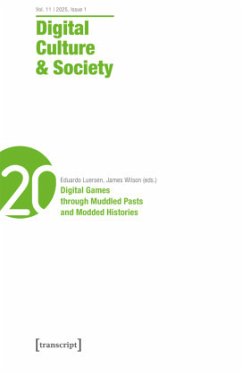The emerging field of historical game studies focuses on the representations of the past in digital games. One aspect, however, has often been overloooked: the significant role of game production aspects in these representations. This issue integrates new perspectives from History, Digital Humanities, and Game Studies to explore the epistemological and political implications that arise from the practical interweaving of game development and historical knowledge. The contributions show how the decision-making process behind these games is tailored between developers, narrative designers, and historical advisors, and illustrate the significance of historical knowledge and popular historical narratives within the gaming industry.
Bitte wählen Sie Ihr Anliegen aus.
Rechnungen
Retourenschein anfordern
Bestellstatus
Storno

